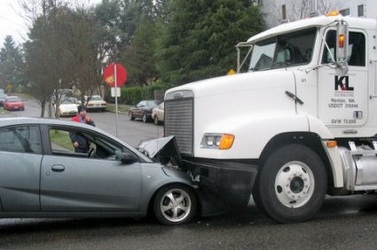The Differences between Car and Trucking Accidents
Despite common perception, all vehicle accidents are not created equal. For instance, trucking accidents and the manner in which they are handled are distinctive in a number of key areas. Trucking accidents are defined as vehicle collisions involving tractor trailers, 18-wheelers, semi-trucks and other commercial vehicles that cause personal injury and/or property damage.
According to statistics released by the Federal Motor Carrier Safety Administration, accidents that involved large commercial trucks accounted for 287,000 property damage claims, 77,000 injuries and 4,321 deaths over the course of a single year. Because commercial trucks are generally significantly larger than the vehicle that they collide with, the damage to the other vehicle is usually substantial. Relatively speaking, large trucks are responsible for a small portion of the accidents that take place on highways; however, the size of these trucks increase the possibility of harm or more serious damage than usual. Basically, truck accidents tend to be more catastrophic.
Another distinction between truck accidents and car accidents is the fact that the cost and effort associated with investigating and pursuing the remedies associated with a trucking accident will generally be more time-consuming, complex and costly.
Dealing with Different Causes
Settling disputes associated with trucking accidents are not always simple and straightforward, primarily because of the added possible causes of an accident. With the average automobile accident, the cause will generally be human error, such as a driver failing to stop at a red light of changing lanes without signaling. With trucking accidents, a significant amount of the responsibility for an accident will still fall of the driver, but it may be indirect, and it may also implicate the trucking company — making them partially or fully liable for the accident.
Equipment failure plays a significant role in the causation of trucking accidents, Equipment failure does not automatically free the driver from liability. The reason that the driver will still be held responsible to some extent is because it is the driver’s responsibility to conduct pre-trip inspections to ensure that all equipment is healthy and functioning properly. The failure of a piece of equipment that should have been inspected by the driver prior to beginning their trip will likely result with the driver being held responsible.
The equipment failure could also implicate the trucking company, if it can be proven that the company acted negligently in failing to ensure that the truck was properly maintained. If possible, the victim of a trucking accident should take as many pictures of the accident as possible, especially when it comes to indications of equipment failure or driver error.
Compensation for Damages Incurred During a Truck Accident
The law allows for a person who has been injured and/or incurred property damage as a result of a trucking accident that was not their fault to be compensated to the point that will place them back at the position, financially and physically, that they were in before the accident. Determining what this means can be very difficult immediately after the accident, especially if there are injuries.
The person who has been injured, or had their vehicle damaged by an at-fault truck driver will have the option of recovering damages by suing the parties involved. Like car accidents, trucking accident victims have the right to be compensated for medical care, nursing home costs, rehabilitation, domestic services, loss of earnings, and loss of earning capacity.
The person injured in the accident is also entitled to damages associated with pain and suffering, inconvenience, emotional suffering, loss of employment life, disfigurement and loss of consortium or diminishment of relations with a spouse. Depending on the state in which the accident took place, there may be limitations on the amount of non-economic damages that can be rewarded to the victim.
Truck Accident Injuries
One of the greatest distinctions between a common car accident and a trucking accident, especially when it comes to accidents involving semi-trucks, is the extent of the injuries of the victim or victims. A fully loaded semi-truck can weigh more than 80, 000 pounds. When consideration is given to the fact that the average car weighs approximately 3,000 pounds, it is easy to predict how a collision between the two will turn out. Accidents involving cars, regular-sized trucks and SUV’s that collide with large commercial trucks tend to produce very serious injuries. These serious injuries are why truckers are required to carry insurance with larger-than-normal liability limits. The higher liability limits mean that there is more money available for the injured party.
Special Truckers Licenses & the Possibility of Negligence
Because of the state and federal regulations that govern commercial trucking, it is likely that the driver of the truck involved in a trucking accident will have undergone specialized education and training, as well as formalized specific instructions associated with the type of load that they are carrying. All commercial truck drivers should possess a commercial driver’s license that is reflective of their level of training, qualifying them to carry the load that they are currently carrying. The reason that it is important to be aware of the specific requisites associated with training and qualifications is that if an accident occurs and the driver does not possess the proper qualifications, the trucking company could be held liable for negligence in the area of hiring and training.
The Reason to Involve an Attorney
Because of the complexity involved with investigating and evaluating the case, as well as properly filing the appropriate documents in a trucking accident case, it is recommended that trucking accident victims contact a qualified injury attorney that is experienced in trucking accidents.
Working with a professional who understands the intricacies associated with a trucking accident case will improve the chances of the victim receiving all of the compensation they are entitled to. The trucker and the trucking company will have their insurance companies and lawyers representing their best interests, making it imperative for the victim to have someone representing theirs.



